|
Word Gems
exploring self-realization, sacred personhood, and full humanity
Metaparadigm
“Paradigms are like glasses. When you have incomplete paradigms about yourself or life in general, it's like wearing glasses with the wrong prescription. The lens affects how you see everything else.” Sean Covey
Editor’s Essay: Your Life and Behavior Will Change Naturally, Easily, and even Quickly, When Your Metaparadigm Changes
Cambridge biologist Colin Tudge: The most important questions cannot be resolved by logic, calculation, the scientific method, or by conventional philosophy. How can we know what is true? All our ideas are founded upon layers of presuppositions, things that we must assume are the case but which we cannot ultimately show beyond all doubt really are.

Stanislav Grof: “A radical inner transformation and rise to a new level of consciousness might be the only real hope we have in the current global crisis brought on by the dominance of the Western mechanistic paradigm.”
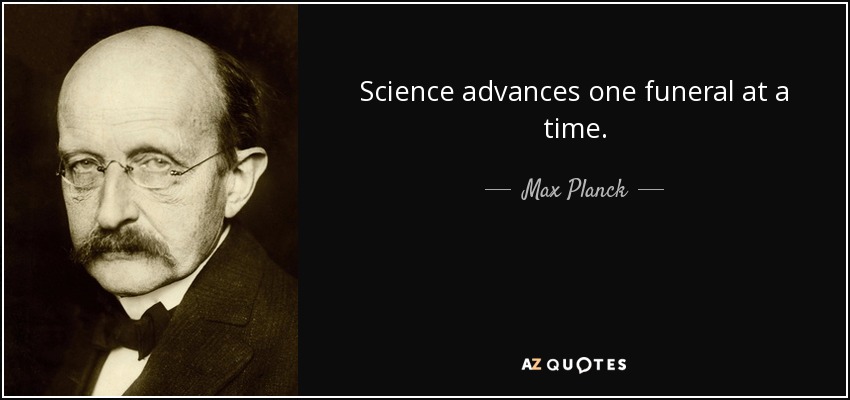
Donella Meadows: “Your paradigm is so intrinsic to your mental process that you are hardly aware of its existence, until you try to communicate with someone with a different paradigm.”
Thomas Kuhn: “Rather than being an interpreter, the scientist who embraces a new paradigm is like the man wearing inverting lenses.”
|
That which was true yesterday, though it has still elements of truth, is not so in the light of new knowledge. Knowledge is something ever changing. Man is ever experiencing new things, gaining greater understanding, greater realisation, greater wisdom and, in consequence, knowledge becomes ignorance through the light of new knowledge.
An ancient Chinese man, from the other side, offered testimony via Leslie Flint direct-voice mediumship; tape-recorded July 30th 1959.
"I have lived on your plane of Earth centuries ago, in China. I have been called by several names, and I do not feel that it would be any advantage for you to know these names... For a man who was wise, as you understand it, upon Earth, as soon as he passes through the gates called death, he realises that his Earthly wisdom was as naught. Wisdom is purely the condition or state of being which may apply, and does apply, until such time as you have progressed to a further state - and that which was wisdom in the past becomes ignorance, in consequence of the wisdom gained. Wisdom is something which is a state of being according to one's knowledge of things appertaining at the time. But that which was true yesterday, though it has still elements of truth, is not so in the light of new knowledge. Knowledge is something which is ever changing. Man is ever experiencing new things, gaining greater understanding, greater realisation, greater wisdom and, in consequence, because movement is life, because man cannot remain stationary, knowledge becomes ignorance through the light of new knowledge… We who come to you know that man will only find divine truth when he himself becomes divine, when he himself becomes spiritually attuned into the higher spheres and the greater souls who come… [There are] tremendous things that lie further ahead in the higher spheres - where it is impossible in words to depict in any shape or form such a condition of life… You cannot see these things, for you are not ready to see. You cannot understand these things, for you are not ready to understand. We are not in a world that is three dimensional. We are in a world that is four dimensional, which you could not possibly conceive or understand. It is beyond your comprehension… To all those who seek I say, seek. At the same time remember, that you must be as children and have faith and keep open wide the door that it may enter therein and realise that truth is ever-changing. That which was truth yesterday won't remain as truth, in the light of new truth… It is only, as it were, a little aspect - for we must always remember, it is but a grain, like of sand in the desert of truth, a grain of truth in a huge sea of sand or desert.”
|
Stephen Covey: “If you want small changes in your life, work on your attitude. But if you want big and primary changes, work on your paradigm.”
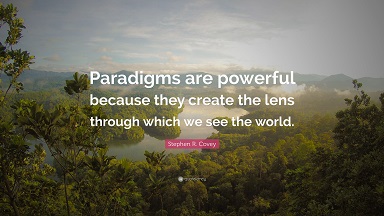
Joel A. Barker: “Usually the first problems you solve with the new paradigm are the ones that were unsolvable with the old paradigm.”
Petros Scientia: “When one person’s worldview differs from the worldview of another person, everything is fine until the two people realize that they aren’t seeing eye to eye. Each thinker will regard anything that clashes with his or her worldview to be insane and in conflict with reality.”
James Gleick: “Ideas that require people to reorganize their picture of the world provoke hostility.”
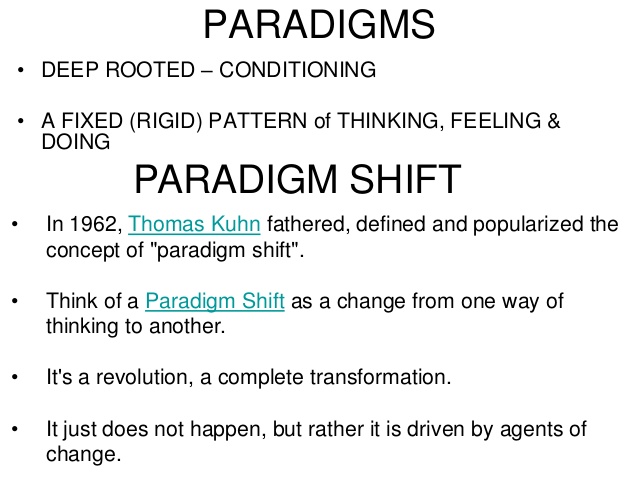
|
materialism, like an odorless gas, stealthily pervades almost every aspect of society, even the religious domain: believe what people do, more than what they say

Dr. Bernardo Kastrup, PhD philosophy, PhD computer science, for many years worked at CERN, the large hadron collider in Geneva.
“It is nearly impossible for any person inserted into a modern cultural context to escape the haze of the zeitgeist and develop a truly unbiased, critical, and personal worldview…
“No society on Earth has a single worldview coordinating the lives of all its citizens, though many a dictator would like just that… [Perspectives such as] religious fundamentalism, material consumerism, showbiz hysteria, political activism, spirituality and New Age, scientism, militant skepticism, and so on. Each of these … entails a particular way to relate to oneself and to reality at large…
Editor's note:
|
more than drinking the koolaid
The long reach of cultism encompasses much more than crackpot churches. The root idea of cult offers the sense of "cut." This core concept of "cut" leads us to images of refinement and refashioning and, by extension, development, control, pattern, order, and system.
Cultism as systemization finds a ready home in religion and philosophy which seek to regulate and redistill the patterning and ordering of ideas. However, in a larger sense, the spirit of cultism extends to every facet of society. We find it scheming and sedulously at work in politics, academia, family, corporations, entertainment, science, artistry – anywhere power might be gained by capturing credulous and fear-based minds.
See the “cultism” page for a full discussion.

|
“Yet [despite this variety] there is [a certain commonality of belief, a metaparadigm, which would unite almost all of these] – a core worldview – that holds more influence than [other views. This is so] even among those people who outwardly [and often most vociferously] declare their allegiance to different belief systems. I am speaking, of course, of Western metaphysical materialism.
“Materialism subtly pervades … nearly every aspect of our lives. Take, for instance, people who consider themselves deeply religious, holding beliefs about the immortality of the soul and the reality of heaven: they, too, often fear death and resist death as if, deep inside, they actually believed that it represented oblivion. They will pray to a divinity to spare them and their loved ones an early demise. They will subject themselves to horrendous medical procedures to extend life for a few more weeks or months. They will weep in anguish at the loss of loved ones as if, deep inside, they believed the dead were lost forever.”

Editor’s note: Kastrup highlights an Amazon rainforest tribe, the Zuruaha. A study of them was done nearly 50 years ago before the advent of any culturally-contaminating materialistic influence by the West. These primitives so closely clung to a view of reunion with departed relatives -- for them, a greater reality -- that suicide was often chosen. This occurred despite generally excellent health - even at rates approaching 85% of the adult population! The desire to be with loved ones had been so deeply internalized, had come to represent the tribe's metapardigm, that suicide was often viewed as the better way to deal with life’s crises.
“[M]aterialism influences our ‘subconconscious’ reactions, attitudes, and values in many other aspects of life, not only our beliefs regarding the after-death state. For example … the Western love affair with things. It is our often ‘subconscious’ belief that only matter truly exists that drives our urge to achieve material success. After all, if there is only matter, what other goal can there conceivably be in life other than the accumulation of material goods? …
"[This causes] people to work long hours, often having to tolerate unpleasant circumstances, in order to improve their status and financial condition well beyond otherwise acceptable levels. It is also this belief that motivates people to spend hard-earned income on unnecessary goods and premature upgrades. The materialist worldview has caused many of us to project numinous value and meaning onto things.”
Editor’s note: Subtle forms of materialist belief also lead many to be hoarders, Silas-Marner misers in the night, garage-sale addicts, collectors of trinkets and junk, inveterate shopping-channel devotees -- stuffing our lives with sterile things.
Dr. Kastrup explains that an undercurrent of materialism leads us to value too highly the opinions of materialist science. High priests in the temple of only-matter-is-real, today’s physicists and chemists, are granted too much deference as they shape perceptions of reality for the masses. Matter cannot give us meaning and deeper answers. Materialistic science can discover patterns and regularities of the natural world, but it cannot speak to an underlying purpose of the universe, of life and love, of why we’re here and how we should live. As such, we should also be allowing the microphone of opinion to be shared by philosophers, poets, artists, mystics, and spiritualists. Instead, to our great detriment, one that invites societal perdition, our materialistic world listens solely to those who proclaim a metaparadigm of “matter is the true and only reality.”
many of Big Religion’s doctrines are materialistic in nature
How can this be? you might ask. Religion ever speaks of God, heaven, sin, redemption and the like. How can this be materialistic? The answer here concerns thoughts in our head. Thoughts about God, and talk about God, are not the same as accessing the real God. Thoughts are just thoughts, seemingly pious though they may be. The problem with worldly religion, despite its profuse reference to “the spirit”, is that it conceives of God, too often, as some sort of anthropomorphic entity, a “sky god,” living in some spatially-oriented place, sitting on a throne. These concepts are grossly materialistic. God, the Bible says, is Spirit, not “a spirit”; that is, God is being itself, is consciousness itself. And this contamination by materialism also extends to misperceptions concerning what we are as human beings. The religious view, essentially, is Newtonian: we are machines and cannot change. There is no growth, no personal change, in the afterlife, Big Religion is wont to pontificate. And despite all of its talk about change or growth here, in this world, they don’t really believe in change, not as you and I might speak of change, but rather subscribe to a magical “make-over,” which is why third-party sacrificial atonement and redemption is emphasized. All these are but subtle forms of materialism: God is not within but “out there,” there is no power to change deep within, and we cannot grow, not in the ordinary sense of the term, but are like machines, static and stagnant, requiring an overhaul and re-facing. See the article devoted to this topic of religion as a form of materialism.
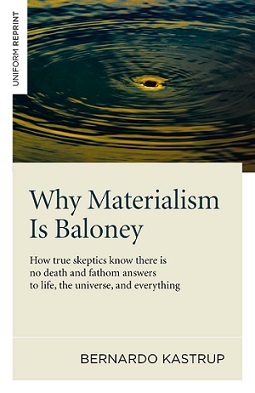
READ MORE of Dr. Kastrup's work on the “quantum mechanics” page
|
Maria Karvouni: “Seasons change and people's minds change. Every person's stance in life is fragile and is prone to shifting based on where their future is.”
Petros Scientia: “Worldviews seem real but they aren’t real. Our worldviews tend to guide our thinking about everything. And then our assumptions come out of those worldviews.”
Michael Davidow, Split Thirty: “Did you know that Judaism is based on paradigm shifts, Henry? First came Abraham, then came Moses. Then came the prophets, then came the rabbis. Pretty amazing stuff. Each iteration, reaching for the godhead. What comes next, Henry? What comes next?”
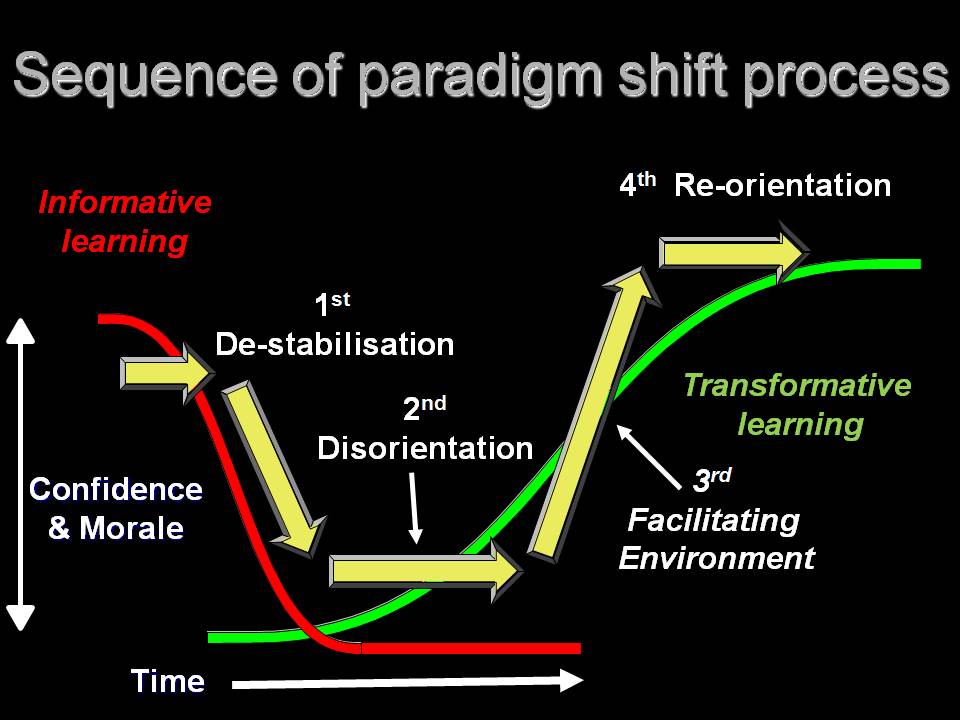
Matthew Donnelly: “The World is a product of all the different cultures in the World. True World impact and change of direction will be done by shifting the paradigm of every world culture.”
Thomas S. Kuhn, The Structure of Scientific Revolutions (1962): “Almost always the men who achieve these fundamental inventions of a new paradigm have been either very young or very new to the field whose paradigm they change.”
Thomas S. Kuhn, The Structure of Scientific Revolutions (1962): “We may... have to relinquish the notion, explicit or implicit, that changes of paradigm carry scientists and those who learn from them closer and closer to the truth... The developmental process described in this essay has been a process of evolution from primitive beginnings—a process whose successive stages are characterized by an increasingly detailed and refined understanding of nature. But nothing that has been or will be said makes it a process of evolution toward anything.”
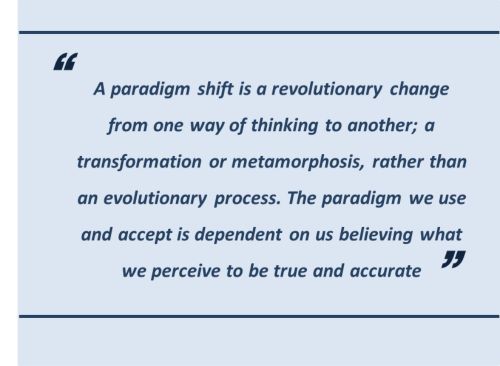
Al Gore: “Well-established theories collapse under the weight of new facts and observations which cannot be explained, and then accumulate to the point where the once useful theory is clearly obsolete.”
Carl Sagan: “In science it often happens that scientists say, 'You know that's a really good argument; my position is mistaken,' and then they would actually change their minds and you never hear that old view from them again. They really do it. It doesn't happen as often as it should, because scientists are human and change is sometimes painful. But it happens every day. I cannot recall the last time something like that happened in politics or religion.”
Max Planck: Science advances one funeral at a time: “A new scientific truth does not triumph by convincing its opponents and making them see the light, but rather because its opponents eventually die, and a new generation grows up that is familiar with it.”
|
Editor's last word:
Al Gore and Carl Sagan express an ideal; it’s the way things should be. But Max Planck hits us squarely with how business is done most often here in the world of the ego. Scientists are human, too.
|
|









